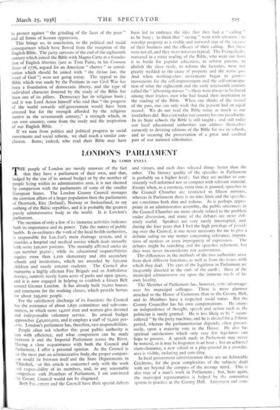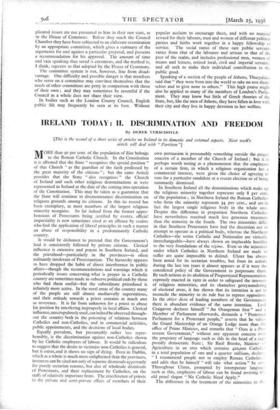LONDON'S PARLIAMENT
By LORD SNELL
THE people of London are mostly unaware of the fact that they have a parliament of their own, and that, judged by the size of its annual budget or by the number of people living within its administrative area, it is not shamed by comparison with the parliaments of some of the smaller European States. The London County Council manages the common affairs of a larger population than the parliaments of Denmark, Eire (Ireland), Norway or Switzerland, to say nothing of the Baltic republics, and it is probably the greatest purely administrative body in the world. It is London's parliament.
The mention of only a few of its immense activities indicates both its importance and its power. Take the matter of public health. It co-ordinates the work of the local health authorities, is responsible for London's main drainage system, and it provides a hospital and medical service which deals annually with some 250,000 patients. The mentally afflicted under its care number 30,00o ; while its educational responsibilities require more than ',too elementary and 26o secondary schools and institutions, which are attended by 650,000 children and nearly 200,000 students. The Council also maintains a highly efficient Fire Brigade and an Ambulance Service, controls nearly 8,000 acres of parks and open spaces, and it is now engaged in helping to establish a Green Belt around Greater London. It has already built 70,000 houses and tenements for the working classes, which provide homes for about 293,000 people.
For the satisfactory discharge of its functions the Council has the assistance of about 1,650 committees and sub-com- mittees, to which some 14,000 men and women give devoted and indispensable voluntary service. Its annual budget approaches £40,000,000, and it employs a staff of 72,00o per- sons. London's parliament has, therefore, vast responsibilities. People often ask whether this great public authority is run with efficiency, and what comparison can be made between it and the Imperial Parliament across the River. Having a close acquaintance with both the Council and Parliament, I offer a personal opinion. As the Council is :or the most part an administrative body, the proper compari- on would be between itself and the State Departments in 'Whitehall, out this article is concerned only with the work Ind responsibility of its members, and, in any reasonable .:omparison with Members of Parliament, I am convinced the Count\ Council would not be disgraced.
Both Par.tament and the Council have their special defects and virtues, and each does selected things better than the other. The literary quality of the speeches in Parliament is probably on a higher level ; but they are neither so con- sistently well-informed nor so compact with relevant material. Except when, as a courtesy, extra time is granted, speeches in the Council Chamber arc restricted to fifteen minutes, whereas in Parliament there is no time limit and the speeches are s)metimcs both thin and tedious. As is perhaps appro- priate in an administrative assembly, the public utterances in the Council Chamber are more closely related to the problem under discussion, and many of the debates are more defi- nitely useful. Speakers are very rarely interrupted, and during the four years that I had the high privilege of presid- ing over the Council, it was never necessary for me to give a definite ruling on any matter concerning relevance, imputa- tions of motives or even impropriety of expression. The debates might be searching and the speeches vehement, but they were never inconsiderate nor acrimonious.
The differences in the methods of the two authorities arise from their different functions, as well as from the issues with which they deal. The eyes of the legislator in Parliament are frequently directed to the ends of the earth ; those of the municipal administrator are upon the intimate needs of his own locality.
The Member of Parliament has, however, some advantages over his municipal colleague. There is more glamour attached to the House of Commons than to the County Hall, and its Members have a respected social status. But the County Councillor has his own compensations. He enjoys an independence of thought, speech and action such as the politician is rarely granted. He is less likely to be " steam- rollered " by the party machine, and he is elected for a definite period, whereas the parliamentarian depends, often precari- ously, upon a majority vote in the House. He also has spiritual satisfactions which only very few legislators can hope to possess. A speech made in Parliament may never be noticed, or it may be forgotten in an hour ; but an achieved slum-clearance, a new school or a play-ground in a crowdec, area is visible, enduring and consoling.
In local government administration there are no Admirable Crichtons, for the great complexities of the subjects dealt with are beyond the compass of the average mind. This is also true of a man's work in Parliament ; but, here again, the municipal representative is helped by the committee system in practice at the County Hall. Important and com- plicated issues are not presented to him in their raw state, as in the House of Commons. Before they reach the Council Chamber they have been subjected to an elaborate examination by an appropriate committee, which gives a summary of the arguments for and against a particular proposal, and presents a recommendation for his approval. The amount of time and vain speaking thus saved is enormous, and the method is, I think, superior to that adopted by the House of Commons.
The committee system is not, however, free from disad- vantage. One difficulty and possible danger is that members who serve on a committee may convince themselves that the needs of other committees are petty in comparison with those of their own ; and they may sometimes be resentful if the Council as a whole does not share their view.
In bodies such as the London County Council, English public life may frequently be seen at its best. Without popular acclaim to encourage them, and with no material reward for their labours, men and women of differenrpolitical parties and faiths work together in a happy fellowship of service. The social status of these rare public servants varies from that of the labourer and artisan to that of the peer of the realm, and includes professional men, women of means and leisure, retired local, civil and imperial servants, and all seek to make their individual contribution to the public good.
Speaking of a section of the people of Athens, Thucydides said that " they were born into the world to take no rest them- selves and to give none to others." This high praise might also be applied to many of the members of London's Parlia- ment. They may know but little of Greek theories of the State, but, like the men of Athens, they have fallen in love with their city and they live in happy devotion to her welfare.











































































 Previous page
Previous page